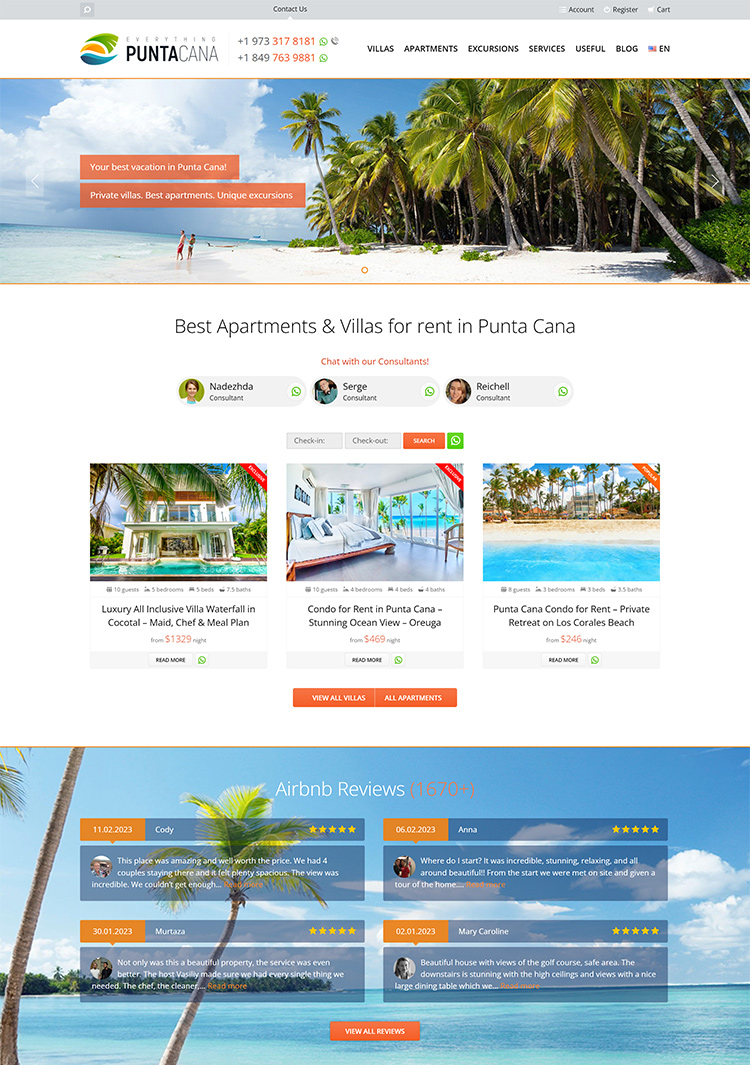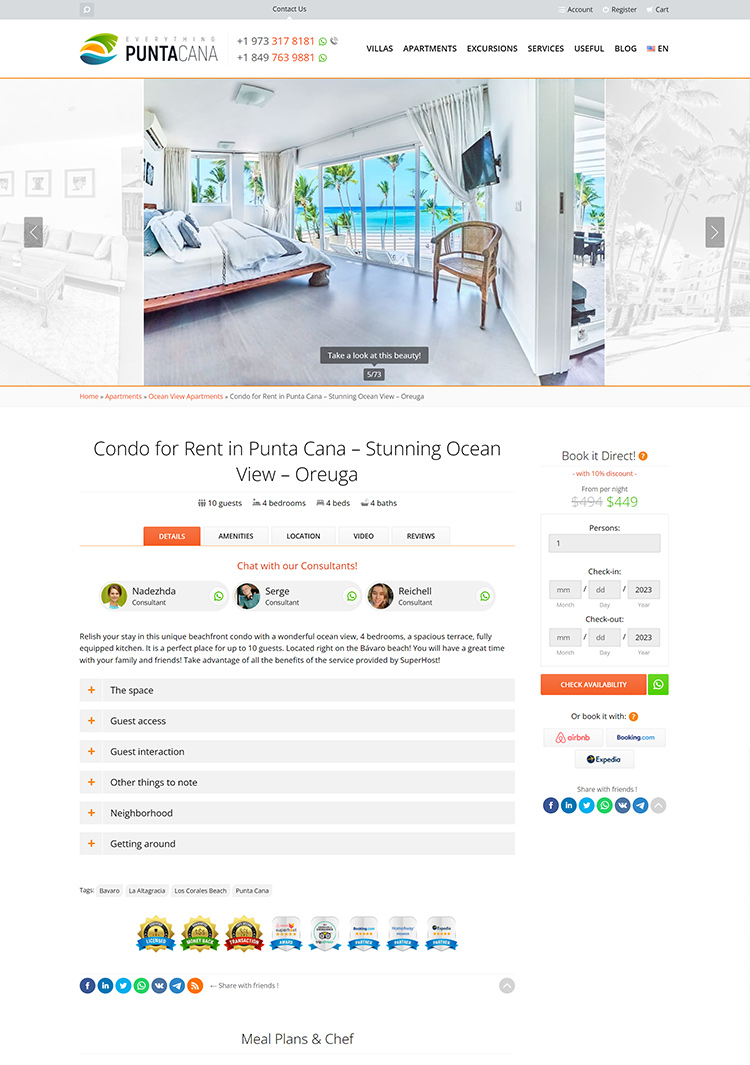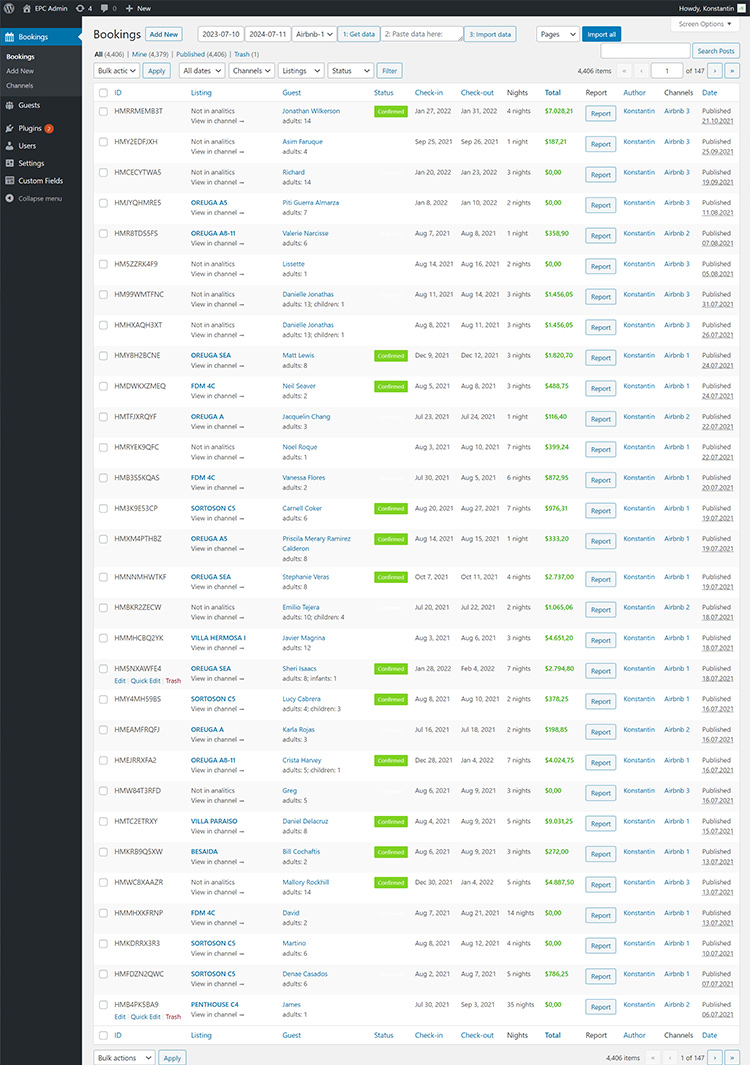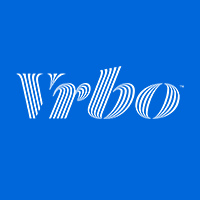Direct Booking Website Complex Development -
Boost Your Business in 2025
We Develop:
Booking websites of any complexity All Kinds of Booking Websites. From simple to complex, we make powerful booking sites, unique rental platforms, and websites that work smoothly with booking channels like Airbnb. ... Show all ↓
Payment gateways & API implementation Adding payment systems, syncing data automatically, and setting up connections are key parts of making booking websites work well. These steps help make sure payments are safe, information is updated instantly, tasks are done without manual effort, and everything works smoothly with other services. By doing this, we make online booking easier and more convenient for both companies and their customers, making sure everyone has a hassle-free experience. ... Show all ↓
Planners & project managers This system offers a comprehensive suite of digital tools designed to enhance the internal operations of an organization. By establishing centralized control panels, it simplifies the management of website content and user access, ensuring that administrators can easily oversee and update digital assets. Secure intranet portals facilitate safe and efficient internal communication and resource sharing, allowing team members to exchange information and collaborate effectively without external risks. ... Show all ↓
Fast, secure, SEO-friendly We create clean, secure, and SEO-friendly booking websites with responsive design, fast performance, and engaging UI/UX animations. Our goal is to deliver high-quality, stable, and reliable websites that attract and convert more customers. ... Show all ↓
From $95 /hour
We Work With the Best OTA Companies
With 10 years of working alongside top online travel agencies, we guarantee the high quality of our services.
Examples of Our Works








Frequently Asked Questions
What is direct booking website?
A direct booking website is a digital platform that lets you book accommodations, flights, or other services straight from the providers themselves, eliminating the need for middlemen or third-party sites.
This setup enables straightforward and direct transactions and communication with the service providers, allowing you to make reservations without going through any intermediaries.
What is an example of direct booking?
Booking a vacation rental directly through a property management company’s own website instead of using platforms like Airbnb or VRBO.
Why do hotels want direct bookings?
When guests book their hotel stays directly, bypassing third-party travel agencies or websites, hotels don’t have to pay commission fees to these external platforms.
This means that hotels can keep all the revenue from bookings, as all payments made by clients go straight to the hotel, enhancing their overall income.
What is the advantage of direct booking?
Direct booking brings multiple advantages such as cost reductions, bespoke communication, and the chance to tailor your stay with special requests.
It offers flexibility for changes and negotiations, plus access to exclusive loyalty rewards and perks, enriching your experience with personalized touches and potential savings.
Is it better to book on Airbnb or directly?
Though Airbnb is known for its convenience and broad selection options, direct bookings often yield the best prices, more customized service, and direct interactions with the host, ensuring a stay that’s both personalized and enjoyable.
How can a direct booking website benefit my guests?
A direct booking website presents guests with unique deals and promotions, not found on external websites. It also simplifies personalized interactions and requests with the host, elevating the guest experience.
What is the importance of booking engine?
The role of a booking engine is crucial in today’s hospitality and rental market. It serves as the backbone for achieving operational efficiency and expanding your property’s visibility to a global audience.
By integrating a booking engine into your website, you provide potential guests with the ability to make reservations directly, anytime and anywhere, without the need for intermediaries.
This 24/7 availability means your property is bookable even outside of traditional business hours, tapping into different time zones and catering to international travelers.
What kind of payment tools do you use with clients?
We support a variety of direct payment methods for convenience and flexibility, including PayPal, Stripe, Zelle, direct deposit, and various cash apps, allowing guests to choose their preferred way to pay.
Is there customer support available?
Our dedicated support team is available via email, phone, and live chat, ready to offer prompt and thorough assistance, ensuring your inquiries and needs are addressed with care and precision.
What are the benefits of direct booking?
Direct booking with hotels often leads to obtaining superior rates compared to third-party platforms, as it eliminates the middleman. This direct interaction not only tends to reduce costs but also enhances the level of service you receive, making it more personalized.
Hotels are more likely to accommodate special requests, such as room preferences or dietary needs, when you book directly. Additionally, direct bookings frequently provide access to exclusive loyalty programs offered by the hotels.
These programs can offer various perks, such as complimentary upgrades, late checkouts, and discounts on future stays, further enriching your travel experience.
This direct relationship fosters a closer connection between you and the hotel, potentially leading to a more customized and rewarding stay.
Is a booking engine integration mobile-friendly?
Sure! Our booking engine is designed to be fully mobile-friendly, ensuring a smooth booking process across all devices, thus never missing out on potential mobile bookings.
What are the benefits of direct booking for hotels?
Direct booking with hotels not only saves you money but also guarantees a more customized communication channel and the opportunity to enjoy special requests, making your stay more personal and rewarding.
Is it possible to customize my direct booking website to match my brand identity?
Yes! We offer extensive customization for your direct booking website to mirror your brand’s identity, incorporating your unique style, logo, and color scheme to make a lasting impression on your guests.
Can I integrate a booking engine into my direct booking website?
Absolutely, incorporating a booking engine is crucial to facilitate instant bookings and ensure a smooth reservation process for guests.
How can I ensure secure payments and protect customer data on my direct booking website?
To ensure the security of payments and safeguard customer information, we implement SSL certificates, secure payment gateways, and comply with data protection laws.
Can I offer special promotions or packages exclusively through my direct booking website?
Yes, utilizing your direct booking website to offer unique promotions or packages is an effective strategy to encourage direct bookings and deliver additional value to your guests.
More Traffic and Guests
Advantages of Direct Booking Website
Increased Revenue
By avoiding OTA commissions, which can be as high as 30%, you directly enhance your revenue. Focusing on direct bookings lowers your distribution costs, making your business more profitable.
Enhanced Brand Awareness
Building a strong online presence with an optimized website and active social media boosts brand visibility, attracting more site visitors and shaping your brand image.
Personalized Guest Experiences
Direct communication with guests allows for personalized service and offerings, enhancing their experience and building loyalty. Tailored experiences foster trust and credibility for your brand.
Improved Guest Communication
Direct bookings enable better communication with guests, allowing you to address their needs more effectively and build stronger relationships, which are key to guest satisfaction and retention.
Exclusive Offers
Offering unique value-add deals for direct bookings can turn potential guests into loyal customers, encouraging repeat visits and positive word-of-mouth.
Trust and Credibility
A direct booking website instills trust by providing a secure and straightforward booking process. This transparency fosters a trustworthy relationship between you and your guests.
Market Share Growth
An effective direct booking strategy, supported by the right technology, can significantly increase your market share by capturing guests who prefer booking directly.
Effective Promotions
Direct booking websites enable you to launch and manage promotions effectively, targeting your audience with precision and enhancing booking rates.
Technical Flexibility
Custom development allows for unique functionalities and integrations tailored to your specific needs, offering flexibility and scalability for your booking platform.
Global Accessibility
A well-designed direct booking website ensures your property is accessible to a global audience, increasing your potential guest pool and enhancing visibility.
Expertise and Insights
Gain valuable insights and expertise on market trends, customer behavior, and booking patterns, enabling you to make data-driven decisions to optimize your direct booking strategy.
E-Commerce Integration
Integrate e-commerce capabilities, allowing guests to not only book directly but also purchase additional services and products, enhancing their overall experience and increasing your revenue.
Enhanced SEO
A well-optimized direct booking website improves your search engine visibility, attracting more organic traffic and reducing reliance on paid advertising and OTA listings.
Mobile Optimization
Ensure your website is fully optimized for mobile devices, providing a seamless booking experience for users on-the-go and tapping into the growing trend of mobile bookings.
Show all ↓
Understanding Direct Booking & Its Importance
How do consumer behaviors impact the strategies for direct booking websites?
Consumer behaviors significantly impact the strategies for direct booking websites. With the surge in digital savviness, consumers expect fast, and secure booking experiences. They are more likely to book directly with a hotel or service provider if the website offers competitive pricing, exclusive deals, and loyalty rewards. Furthermore, consumers value transparency and are more inclined towards websites that provide clear information about cancellations, refunds, and no hidden fees. The demand for personalized experiences means that direct booking sites must leverage data analytics to tailor offerings to individual preferences.
In the ever-evolving landscape of the travel and hospitality industry, direct booking websites must adapt to the latest technological advancements and consumer behavior trends. Implementing AI for personalized experiences, optimizing for mobile users, and focusing on sustainability are key to staying competitive.
Additionally, understanding and adapting to consumer expectations for transparency, personalization, and exclusive benefits can significantly enhance direct booking strategies. Businesses looking to develop a direct booking website should prioritize these elements to meet consumer demands and drive direct bookings effectively.
Direct Booking vs. Other Booking Methods
How can direct booking reduce dependency on OTAs and increase profitability?
Direct booking can significantly reduce dependency on Online Travel Agencies (OTAs) and increase profitability by eliminating commission fees that typically range from 15% to 25% per booking. By driving bookings through their own website, hotels and service providers have better control over their revenue. Additionally, direct booking enables the collection of customer data, facilitating personalized marketing efforts and building customer loyalty through tailored experiences and rewards. This direct engagement increases the likelihood of repeat bookings and recommendations, further boosting profitability.
What are the challenges of transitioning from OTA bookings to direct bookings?
Transitioning from OTA bookings to direct bookings presents several challenges. The first is visibility, as OTAs often have significant marketing budgets and reach, making it difficult for individual providers to compete for attention. Another challenge is the consumer’s perception of convenience and value, as many travelers believe OTAs offer the best deals and a one-stop-shop for comparing options. Additionally, developing a user-friendly, secure, and efficient direct booking system requires upfront investment in technology and marketing. Finally, hotels must also work on building brand loyalty and recognition to encourage direct bookings.
To effectively reduce dependency on OTAs and increase profitability, direct booking strategies must focus on leveraging technology to offer personalized experiences and rewards, improving the direct booking process, and implementing targeted marketing strategies to enhance visibility and brand loyalty. Despite the challenges, transitioning to direct bookings can lead to significant long-term benefits, including higher profit margins and more control over customer relationships.
Businesses should consider these strategies as investments in their future growth and competitiveness in the hospitality market.
Functionality and Operation of Booking Systems
What are the key features that make a direct booking website user-friendly?
A user-friendly direct booking website should include easy navigation, fast loading times, and a simple, intuitive booking process. High-quality images and detailed descriptions of the offerings enhance the browsing experience. Clear pricing information, including any discounts or special offers, and transparent policies on cancellations and refunds are essential. Additionally, features such as the ability to compare options, save favorites, and access customer reviews and ratings can significantly improve the user experience.
How can direct booking websites be optimized for mobile users?
Optimizing direct booking websites for mobile users involves implementing a responsive design that automatically adjusts to various screen sizes and orientations. The website should feature compressed images and streamlined content to ensure fast loading times on mobile devices. Simplifying the booking process with fewer steps and requiring minimal typing can greatly enhance the mobile experience. Additionally, integrating with mobile wallets and payment systems can facilitate a smooth and secure checkout process.
What are the best practices for ensuring the security of customer data on direct booking websites?
Ensuring the security of customer data on direct booking websites involves several best practices. Implementing secure socket layer (SSL) encryption is crucial for protecting data in transit. Regularly updating and patching the website’s software can prevent vulnerabilities. It’s also important to comply with data protection regulations such as GDPR by obtaining consent for data collection and allowing users to access or delete their information. Finally, conducting regular security audits and penetration testing can help identify and mitigate potential security risks.
Integrating AI and machine learning can transform direct booking systems into dynamic, personalized platforms that drive sales and enhance user satisfaction. A focus on user-friendly design, mobile optimization, and data security not only improves the customer experience but also builds trust and loyalty. By implementing these strategies, businesses can develop a competitive edge in the digital marketplace, ensuring their direct booking website attracts and retains customers effectively.
Strategic Importance and Marketing
How can direct booking websites be integrated with social media platforms for enhanced marketing?
Direct booking websites can be integrated with social media platforms through social media sharing buttons, enabling users to easily share their bookings or experiences. This not only increases visibility but also serves as a form of endorsement. Hotels and service providers can also use targeted social media advertising to reach potential customers based on their interests and behaviors. Featuring user-generated content from social media on the direct booking site can further enhance credibility and attract more visitors. Additionally, engaging with customers through social media platforms for customer service and feedback can improve brand loyalty and encourage direct bookings.
What analytics tools are essential for tracking the performance of a direct booking website?
Essential analytics tools for tracking the performance of a direct booking website include Google Analytics for comprehensive website traffic analysis and customer behavior insights. Heat mapping tools like Hotjar or Crazy Egg can provide visual insights into how users interact with the website. Conversion rate optimization (CRO) tools can help identify the most effective elements for encouraging bookings. Additionally, SEO analytics tools are crucial for understanding how the website performs in search engine rankings and identifying opportunities for improvement.
How can direct booking websites offer personalized experiences to users?
Direct booking websites can offer personalized experiences to users by utilizing data analytics and AI to understand customer preferences and behaviors. Personalization can be achieved through customized recommendations for rooms, services, or packages based on past bookings and browsing history. Personalized email marketing campaigns offering special deals or information relevant to the individual’s interests can increase engagement. Furthermore, enabling users to set preferences for their stays or experiences directly on the website can enhance satisfaction and loyalty.
What are effective loyalty programs or incentives that can be integrated into direct booking websites to encourage repeat bookings?
Effective loyalty programs or incentives include points or rewards systems where guests earn points for each booking that can be redeemed for discounts, upgrades, or free stays. Exclusive deals or perks for members, such as early check-in, late check-out, and complimentary amenities, can also encourage repeat bookings. Personalized offers based on the customer’s booking history or preferences can further enhance the appeal of the loyalty program. Integrating these programs seamlessly into the booking process and prominently displaying the benefits on the website can significantly increase participation and customer retention.
Integrating direct booking websites with social media and utilizing advanced analytics tools are crucial strategies for enhancing marketing efforts and understanding customer behaviors. Offering personalized experiences and developing effective loyalty programs are key to building long-term relationships with customers and encouraging repeat bookings. By implementing these strategies, businesses can increase direct bookings, reduce dependency on OTAs, and ultimately drive profitability.
Design and User Experience
How does website design impact the conversion rate for direct bookings?
Website design has a significant impact on the conversion rate for direct bookings. A clean, attractive design that aligns with the brand’s image can make a positive first impression on visitors. User-friendly navigation and an intuitive booking process are essential for guiding users smoothly from landing on the site to completing a booking. High-quality images and detailed descriptions of the offerings can significantly influence decision-making. Moreover, ensuring the website is responsive and mobile-friendly is crucial, as a growing number of users book through mobile devices. Poor design can deter potential customers, while a well-designed website can greatly enhance the likelihood of conversion.
What are the best practices for reducing booking abandonment on direct booking websites?
To reduce booking abandonment, direct booking websites should ensure a simple and straightforward booking process, minimizing the number of steps and required information. Offering multiple payment options can cater to different preferences and reduce drop-offs. Transparent pricing with no hidden fees is essential, as unexpected costs are a common reason for abandonment. Implementing a save for later feature allows users to easily return to their booking, while reminder emails can encourage them to complete their reservation. Providing reassurance about security and privacy throughout the booking process can also help reduce abandonment.
How can chatbots and virtual assistants be utilized to improve the booking experience?
Chatbots and virtual assistants can greatly improve the booking experience by offering 24/7 instant customer support. They can answer frequently asked questions, assist with the booking process, and provide personalized recommendations, making the experience smoother and more engaging for users. AI-powered chatbots can learn from interactions to provide more accurate and helpful responses over time. They can also assist in handling changes or cancellations, reducing the workload on human customer service staff and improving efficiency. Incorporating chatbots into the booking experience can enhance customer satisfaction and potentially increase conversion rates.
Effective website design and user experience are critical for maximizing direct booking conversion rates. A user-friendly design that facilitates an easy and secure booking process, combined with the strategic use of chatbots for enhanced customer interaction, can significantly reduce booking abandonment and improve overall customer satisfaction. Implementing these best practices allows businesses to create a seamless and inviting online booking environment, encouraging more direct bookings and fostering customer loyalty.
Payment Processing and Financial Management
What payment processing solutions are best for direct booking websites?
The best payment processing solutions for direct booking websites are those that offer security, reliability, and a wide range of payment options. Solutions like Stripe, PayPal, and Square are popular due to their ease of integration, strong security measures (including PCI compliance), and ability to handle multiple currencies and payment methods (credit/debit cards, bank transfers, and digital wallets). It’s important for these systems to provide a seamless checkout experience, minimizing friction and reducing the chances of booking abandonment. Additionally, solutions that offer advanced features like fraud detection and prevention can further enhance the security and reliability of the payment process.
How can direct booking websites handle cancellations and refunds efficiently?
Efficient handling of cancellations and refunds can be achieved by establishing a clear and fair cancellation policy that is communicated to customers at the time of booking. Automating the refund process as much as possible can ensure timely returns and reduce administrative overhead. This includes integrating with payment processors that support automatic refunds. Offering alternatives to refunds, such as credit for future bookings or the option to change dates, can also help maintain revenue while accommodating customer needs. Effective communication is key, so providing immediate confirmation of cancellations and refunds through email or SMS can improve customer satisfaction and trust.
Choosing the right payment processing solution and efficiently managing cancellations and refunds are crucial aspects of financial management for direct booking websites. By focusing on security, offering a variety of payment options, and ensuring clear communication and flexible policies regarding cancellations, businesses can enhance customer trust and satisfaction.
These practices not only streamline financial operations but also contribute to a positive booking experience, encouraging repeat business and positive reviews.
Show all ↓
Order Direct Booking Website
If you have any questions or need more details about our services, prices, or anything else, please don’t hesitate to reach out. We’re always here to help and look forward to hearing from you!












